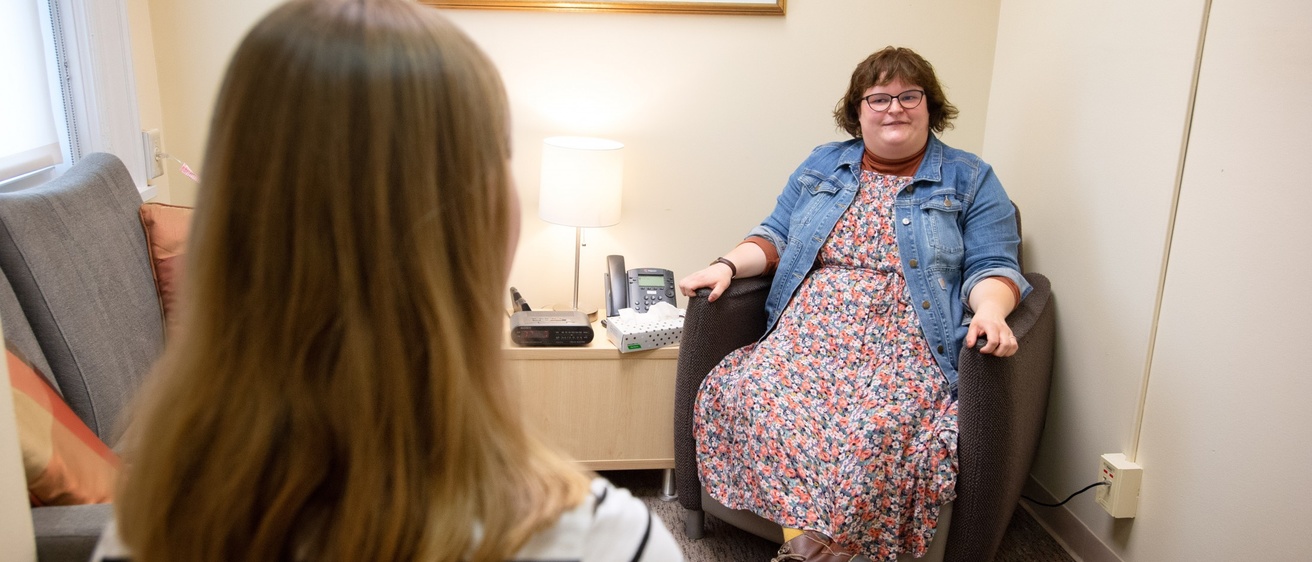
Breadcrumb
- Home
- Programs and Services
- Counseling
Counseling
Main navigation
Individual counseling services are available at WRAC during the Fall and Spring semesters. Counseling is provided by advanced graduate students who are doing their practicum at WRAC. Counseling services are confidential, and offered at no cost, to UI students, employees, postdoc scholars, and the public.
To request counseling services, please email wrac@uiowa.edu. You will be asked for some basic information, including how the counselor can contact you directly to set up your initial appointment. All information you provide will be kept confidential.
Our 2025-26 Counselors
Allison Bywater
Pronouns: she/her
Doctoral Candidate in Counseling Psychology, University of Iowa

I’m Allison Bywater, a doctoral candidate in Counseling Psychology at the University of Iowa. At WRAC, I offer individual counseling for individuals who are navigating life transitions, relationship challenges, identity exploration, or healing from difficult life experiences.
My therapeutic approach is relational, insight-oriented, and empowerment-focused. In therapy, we will look closely at the patterns that shape your relationships and sense of self — including the ways these patterns may appear in our work together. By slowing down and paying attention to your feelings and needs in the “here and now,” therapy becomes a space to practice new experiences of vulnerability, connection, and self-trust.
I also bring an intersectional and feminist perspective to my work, which means I recognize how social systems, cultural messages, and lived identities affect mental health and wellbeing. I view therapy as a collaborative process: your voice, values, and choices matter deeply. Together, we’ll create space for reflection, healing, and growth — while also gently challenging old patterns that may be holding you back.
Across my training, I have supported clients through reproductive health challenges, eating and body image concerns, trauma and grief, and major life transitions. When it’s helpful, I integrate practical strategies from Cognitive Behavioral Therapy (CBT) and Dialectical Behavior Therapy (DBT) to support you in managing strong emotions, shifting unhelpful thought patterns, and building resilience.
Clients describe me as warm, reflective, and collaborative. You can expect me to listen deeply, ask thoughtful questions, and also invite you to take relational risks that may feel new — like expressing needs, tolerating vulnerability, or seeing yourself with more compassion.
As poet Mary Oliver reminds us, “You do not have to be good. You only have to let the soft animal of your body love what it loves.” I believe therapy is a place where we can begin to lay down the weight of “being good enough” for others and instead move toward authenticity, self-acceptance, and connection.
Lexi Horaney
Master's-Level Student in Clinical Mental Health Counseling

As a master's-level student in Clinical Mental Health Counseling, I am passionate about helping individuals navigate the long-term effects of past trauma and persistent mental health challenges. My clinical focus is rooted in the understanding that our experiences—especially those shaped by trauma—can deeply influence the way we perceive ourselves, others, and the world around us.
With the combination of Gestalt and Cognitive Behavior Therapy, my aim is to increase awareness of present- moment thoughts, feelings, and behaviors, exploring how unresolved experiences may be impacting current functioning. My approach is grounded in the belief that the mind doesn't just respond to reality—it helps shape it.
I aim to support clients through their personalized journeys of growth and healing and wish to cultivate an empowered sense of self.
Megan Prass, M.A.
Pronouns: She/Her
Doctoral Candidate, University of Iowa Counseling Psychology

As a therapist, I take an integrative approach to therapy, drawing from person-centered, psychodynamic, and Acceptance and Commitment Therapy (ACT) frameworks. I believe that the therapeutic relationship is central to healing and growth, and I strive to create a safe, collaborative, and affirming environment where clients feel supported and understood.
I am especially interested in exploring the ways past experiences shape current challenges, as well as helping clients develop greater self-awareness, resilience, and compassion for themselves. My work is guided by the belief that therapy should be responsive to each client's unique needs, identities, and goals, and I tailor interventions with empathy, respect, and flexibility.
I approach therapy with cultural humility, remaining mindful of the broader social, cultural, and environmental realities that affect clients' daily lives. I am deeply committed to supporting individuals from historically marginalized communities, working alongside clients to honor their experiences, affirm their strengths, and foster empowerment and meaningful change.